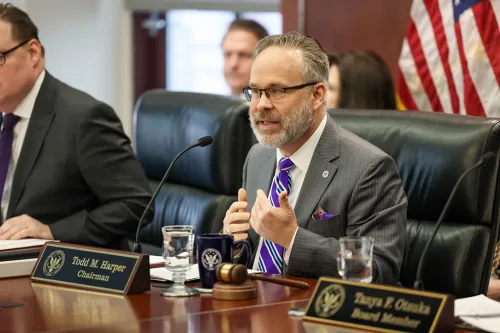NCUA Chairman Todd M. Harper during a meeting of the NCUA Board.
As Prepared for Delivery on December 17, 2024
Thank you, Eugene, Melissa, and Jim, and thank you to the teams in the Office of the Chief Financial Officer and the Office of the Executive Director for developing and finalizing the NCUA’s budgets for 2025 and 2026. Moreover, my heartfelt thanks to Vice Chairman Hauptman, Board Member Otsuka, Sarah Bang, Renita Marcellin, and Catherine Galicia. The level of collaboration and consensus-reaching efforts amongst the three board offices was instrumental in arriving at the budget agreement before us today. I appreciate the many hours spent by all.
Also, thank you to the many stakeholders who participated in this year’s budget briefing and those who provided written comments on the draft budget. Your feedback was helpful to the agency in analyzing where to pare costs and establish priorities.
As Eugene noted in his presentation, the recommended 2025 combined final budget — operating, capital, and Share Insurance Fund administrative expenses budgets — is $395.4 million and 1,255 positions. This final budget is nearly $38 million and six positions lower than the 2025 staff draft budget proposed in October. The 2026 combined budget is $419.5 million and 1,263 positions. This budgeted amount is $49.0 million and 9 positions lower than the 2026 staff draft budget.
As noted in the presentation, the year-over-year increase in the 2025 budget is now just 2.5 percent. That’s nearly 10 percentage points less than initially proposed. And, the 2026 budget has dropped as well. Whereas staff once projected an annual increase of 8.2 percent, the final 2026 budget increase is now 6.1 percent.
Even with these sizable downward adjustments in spending and staffing, the 2025 and 2026 budgets still prudently invest in the areas of cybersecurity and fraud detection in credit unions. The budgets also provide for new staff positions in the areas of consumer financial protection, artificial intelligence, examiner training, as well as in climate-related financial risk.
On that note, I appreciate my Board colleagues working with me to add this new position to our Office of Examination and Insurance. This position will develop a toolkit for credit unions to measure, monitor, and mitigate their climate-related financial risks. It will also aid with updates to the NCUA’s 2006 disaster preparedness guidance to reflect lessons learned from Hurricanes like Helene and Milton, and it will support the creation of training for examiners to help them better understand the lending risks found with solar panels for homes and electronic vehicles.
Many industry stakeholders commented that the NCUA operating fees have been an unreasonable burden on credit unions. Whereas the staff draft budget projected an operating fee increase of approximately 9 percent in 2025, this final budget actually decreases the operating fee by nearly 1.2 percent. What’s more, the NCUA’s operating expenses account for less than 1 percent of total credit union administrative expenses regardless of credit union asset size.
Some stakeholders critical of the NCUA have also asserted that the agency’s budget is growing faster than the rate of inflation. NCUA’s economists examined this issue and found the NCUA’s 2025 budget, when compared to 2016, has grown by approximately the rate of inflation over that period. The agency is not inflating its budgets for its own purposes. The NCUA is simply adjusting its budget to reflect the real-world costs of its operations, responsibilities, and priorities as an agency of the federal government. The NCUA has a proven track-record of managing the resources entrusted to it prudently, and the agency will continue to do so, now and in the future.
In closing, give-and-take is an essential part of any organization’s policymaking and budgeting processes, and the budget before us reflects that principle in action. This funding plan demonstrates the NCUA’s strong financial stewardship, and it will allow the agency to effectively execute its safety and soundness, consumer financial protection, and other statutory responsibilities over the next two years. As such, I will support this NCUA 2025 and 2026 budget agreement.
With that, I look forward to a productive 2025. That concludes my remarks. I now recognize Vice Chairman Hauptman.



